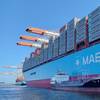In a letter to President Bush yesterday, the West Coast Waterfront Coalition urged the President to take whatever steps are necessary to reopen the ports on the West Coast of the United States.
"The economic impact of the five-day shut down of the ports is mounting," said WCWC Executive
Director Robin Lanier of the letter sent on October 2. "Even if we were to end this impasse today, it would take more than a month to recover and get our supply chains back in working order. This poses a tremendous threat to the holiday business so critical for many American retailers; and ensures that U.S. manufacturers will continue to experience parts shortages even well after ports are reopened.".
The current impact of the lockout include the following:
• Short haul trucking companies at the harbors have effectively been shut down. Their employees and independent owner-operator truckers have no work to perform.
• U.S. rail operations supporting Asian trade are shutting down. Not only are no trains being built at the harbor for inbound commerce, but major railroads have announced that they will no longer
accept containers with export cargo headed for West Coast ports.
• U.S. exporters are unable to send products to customers overseas and export product is backing up in grain elevators and in warehouses.. Exporters of perishables, including produce and other agricultural products critical to the California economy, are being severely impacted as their cargo rots at the ports. As the rail companies shut down operations, export companies dependent on overseas customers are beginning to scale back operations.
• U.S. manufacturers in global just-in-time supply chains face imminent suspension of manufacturing operations as inventories of parts are exhausted. Air freight alternatives are in limited supply and very expensive in the current climate. Even manufacturers who have implemented expensive contingency plans for critical parts will run those supplies down in two weeks time.
• U.S. retailers are entering the critical fourth quarter, during which they experience nearly 40 percent of all annual sales. The shutdown occurs at the height of peak holiday delivery season and may mean that important seasonal merchandise will not reach stores on time resulting in significant lost sales for retailers... In addition, the contingency plans that retailers have taken, including building
their inventories and shipping products by air, add costs that will either be passed on to consumers,
or more likely, will affect the profitability of the retail sector as a whole.
In addition, the group noted in its letter that the technology issues on the table in these negotiations are of critical importance in dealing with congestion, air pollution and security at the nation's seaports. "We
continue to believe that negotiations are the best way to resolve the issues that surround the use of technology,"
the letter says. "We have been hopeful that the two sides would accept a third-party mediator, or that labor and management could once again agree to a day-to-day contract extension that would reopen the ports. But with each passing day this becomes less likely," the organization indicated.
Featured videos

Tracking Foreign Vessels Working in the U.S. Jones Act Market

Inmarsat Enhances Service to Drive Digitalization

Unlock Onboard Data Efficiencies
Subscribe for
Maritime Reporter E-News
Maritime Reporter E-News is the maritime industry's largest circulation and most authoritative ENews Service, delivered to your Email five times per week









